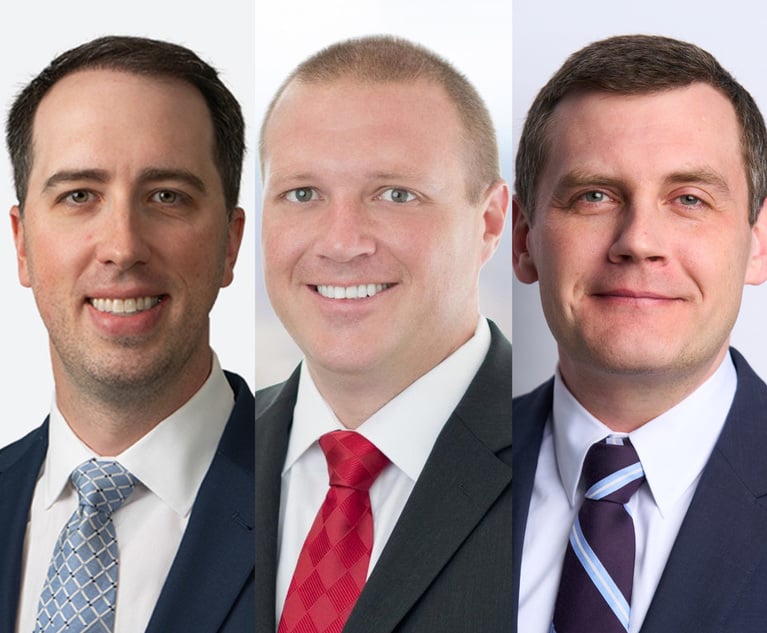 Shari Klevens (left) and Alanna Clair, Dentons. (Courtesy photo)
Shari Klevens (left) and Alanna Clair, Dentons. (Courtesy photo)You've Been Served. Now What?
For some attorneys, the hardest thing can be to act as a client and not as an advocate.
November 04, 2019 at 11:26 AM
6 minute read
Lawyers encounter and work with process servers all the time. But those three words—"You've been served"—when the receiving attorney is the defendant in the lawsuit can take on a whole new meaning and make even the most experienced litigators act in ways that are not in their best legal interest.
It is not difficult to imagine the wide range of emotions a lawyer could feel in this situation. One lawyer who receives a complaint for legal malpractice could respond by lashing out at the client/plaintiff by phone, calling them names and potentially adding more evidence in support of the claim. Another attorney might react with extreme pity or guilt, reaching out to the client/plaintiff to apologize for the alleged error and promising to do everything to make it right. Both reactions—while are extreme—can create risks for the attorney's legal position.
Being sued for malpractice can be scary and isolating. But how an attorney responds to the lawsuit and then participates in or manages the life of the litigation can help reduce the burden over the long haul. Here are some tips for how to maintain sanity as a defendant to a legal malpractice case.
Feel Your Feelings
Attorneys who have been sued for legal malpractice can feel afraid, isolated or even embarrassed. Although it does not feel good to get sued, it will get easier with time. Also, statistics tell us that lawsuits against lawyers are fairly common and that most lawsuits against lawyers lack legal merit. Thus, receiving a legal malpractice lawsuit does not mean that a lawyer's career is over or even that liability is guaranteed.
Part of acknowledging feelings when faced with a legal malpractice lawsuit means taking steps to act rationally with how those feelings are acknowledged or released. Some lawyers might want to blame themselves for the lawsuit and even apologize to the client in an effort to reduce guilt or make the process easier. However, confessions against interest can create liability where none otherwise existed or can even put legal malpractice insurance coverage at risk. Thus, venting is important, but only to the right people—the firm's general counsel, outside counsel, or others with whom the attorney enjoys a privileged or protected relationship.
It is also crucial that attorneys facing a legal malpractice lawsuit pay special attention to and protect their mental health. The stress of the profession coupled with the stress inherent in defending against a legal malpractice lawsuit can lead to an increased risk of depression, anxiety, or substance abuse, which all run rampant in the legal community. Don't be shy about calling a legal assistance program to receive advice, counseling, or support.
Consult With Counsel
Don't go it alone. For lawyers who practice in firms with internal general counsel or risk managers, that is the person to talk to. It will help preserve privilege, trigger protocols aimed at reducing risk, and help facilitate reporting to the insurance company. Having conversations with other people—inside or out of the firm—without that cloak of privilege could potentially be discoverable.
For smaller firms or for malpractice cases that are complex, attorneys may consider hiring outside counsel experienced in legal malpractice issues. It can be a mistake for attorneys who are not experienced in legal malpractice law or defenses to assume that any litigator can manage the defense. Legal malpractice cases are complex and have unique standards and defenses that may not be as well known to those lawyers who do not practice in this space regularly.
Be a Client
For some attorneys defending a legal malpractice claim, the hardest thing can be to act as a client and not as an advocate. It can be difficult to turn off that part of their brain (if litigators) or their heart (if emotionally invested in the matter) and rely on their defense counsel. Lawyers who are sued may feel personally invested in the strategy, particularly if they do not think they breached the standard of care. In those instances, defendant-lawyers may not view the case purely through a client's lens, insisting on aggressive or dramatic strategy as if they were lead counsel. They can forget what it is like to be a lawyer who assesses the risk and best outcomes in a more measured way without such a level of personal involvement.
Legal malpractice lawsuits are difficult and can be emotionally taxing. They can involve lengthy litigation and may be complicated to defend, depending on the facts. Indeed, they are among the most expensive types of litigation, because a plaintiff is often required to prove the "case within a case"—not only that the representing lawyer breached the standard of care, but that the result in the underlying representation would have been different absent that breach.
Part of this sometimes entails a lawyer putting aside their personal feelings about a case or the claimant so that the case can get resolved. Sometimes, a litigant must hold their nose and settle the case so that everyone can move on—which can be hard for a lawyer to do when wearing the "client" hat.
However, by relying on expert advice and taking steps to reduce the risks of malpractice litigation, an attorney can help ensure that a legal malpractice lawsuit does not bring more risk or stress than necessary.
Shari L. Klevens is a partner at Dentons in Atlanta and Washington, D.C., and serves on the firm's U.S. board of directors. She represents and advises lawyers and insurers on complex claims and is co-chair of Dentons' global insurance sector team.
Alanna Clair, also a partner at the firm in Washington, focuses on professional liability and insurance defense. Klevens and Clair are co-authors of "The Lawyer's Handbook: Ethics Compliance and Claim Avoidance" and the upcoming 2020 edition of "Georgia Legal Malpractice Law."
This content has been archived. It is available through our partners, LexisNexis® and Bloomberg Law.
To view this content, please continue to their sites.
Not a Lexis Subscriber?
Subscribe Now
Not a Bloomberg Law Subscriber?
Subscribe Now
NOT FOR REPRINT
© 2024 ALM Global, LLC, All Rights Reserved. Request academic re-use from www.copyright.com. All other uses, submit a request to [email protected]. For more information visit Asset & Logo Licensing.
You Might Like
View All
On The Move: Polsinelli Adds Health Care Litigator in Nashville, Ex-SEC Enforcer Joins BCLP in Atlanta
6 minute read
Akerman Opens Charlotte Office With Focus on Renewable Energy, Data Center Practices
4 minute read

Nelson Mullins, Greenberg Traurig, Jones Day Have Established Themselves As Biggest Outsiders in Atlanta Legal Market
7 minute readTrending Stories
- 1Akin, Baker Botts, Vinson & Elkins Are First Texas Big Law Firms to Match Milbank Bonuses
- 2Walking a Minute in Your Adversary’s Shoes: Addressing the Issue of 'Naive Realism' at Mediation
- 3The Moving Goalposts of Overtime Exemption: Texas Judge Invalidates 2024 Salary Threshold Rule
- 4New Research Study Predicts Continued Growth for Generative AI in Legal
- 5Litera Acquires Document Automation Startup Office & Dragons
Who Got The Work
Michael G. Bongiorno, Andrew Scott Dulberg and Elizabeth E. Driscoll from Wilmer Cutler Pickering Hale and Dorr have stepped in to represent Symbotic Inc., an A.I.-enabled technology platform that focuses on increasing supply chain efficiency, and other defendants in a pending shareholder derivative lawsuit. The case, filed Oct. 2 in Massachusetts District Court by the Brown Law Firm on behalf of Stephen Austen, accuses certain officers and directors of misleading investors in regard to Symbotic's potential for margin growth by failing to disclose that the company was not equipped to timely deploy its systems or manage expenses through project delays. The case, assigned to U.S. District Judge Nathaniel M. Gorton, is 1:24-cv-12522, Austen v. Cohen et al.
Who Got The Work
Edmund Polubinski and Marie Killmond of Davis Polk & Wardwell have entered appearances for data platform software development company MongoDB and other defendants in a pending shareholder derivative lawsuit. The action, filed Oct. 7 in New York Southern District Court by the Brown Law Firm, accuses the company's directors and/or officers of falsely expressing confidence in the company’s restructuring of its sales incentive plan and downplaying the severity of decreases in its upfront commitments. The case is 1:24-cv-07594, Roy v. Ittycheria et al.
Who Got The Work
Amy O. Bruchs and Kurt F. Ellison of Michael Best & Friedrich have entered appearances for Epic Systems Corp. in a pending employment discrimination lawsuit. The suit was filed Sept. 7 in Wisconsin Western District Court by Levine Eisberner LLC and Siri & Glimstad on behalf of a project manager who claims that he was wrongfully terminated after applying for a religious exemption to the defendant's COVID-19 vaccine mandate. The case, assigned to U.S. Magistrate Judge Anita Marie Boor, is 3:24-cv-00630, Secker, Nathan v. Epic Systems Corporation.
Who Got The Work
David X. Sullivan, Thomas J. Finn and Gregory A. Hall from McCarter & English have entered appearances for Sunrun Installation Services in a pending civil rights lawsuit. The complaint was filed Sept. 4 in Connecticut District Court by attorney Robert M. Berke on behalf of former employee George Edward Steins, who was arrested and charged with employing an unregistered home improvement salesperson. The complaint alleges that had Sunrun informed the Connecticut Department of Consumer Protection that the plaintiff's employment had ended in 2017 and that he no longer held Sunrun's home improvement contractor license, he would not have been hit with charges, which were dismissed in May 2024. The case, assigned to U.S. District Judge Jeffrey A. Meyer, is 3:24-cv-01423, Steins v. Sunrun, Inc. et al.
Who Got The Work
Greenberg Traurig shareholder Joshua L. Raskin has entered an appearance for boohoo.com UK Ltd. in a pending patent infringement lawsuit. The suit, filed Sept. 3 in Texas Eastern District Court by Rozier Hardt McDonough on behalf of Alto Dynamics, asserts five patents related to an online shopping platform. The case, assigned to U.S. District Judge Rodney Gilstrap, is 2:24-cv-00719, Alto Dynamics, LLC v. boohoo.com UK Limited.
Featured Firms
Law Offices of Gary Martin Hays & Associates, P.C.
(470) 294-1674
Law Offices of Mark E. Salomone
(857) 444-6468
Smith & Hassler
(713) 739-1250






